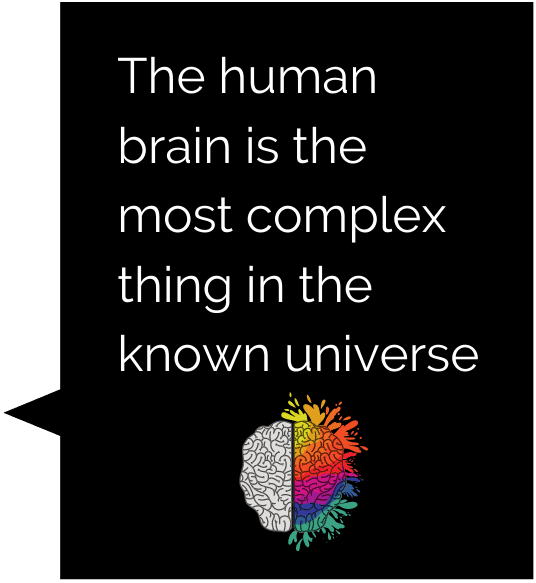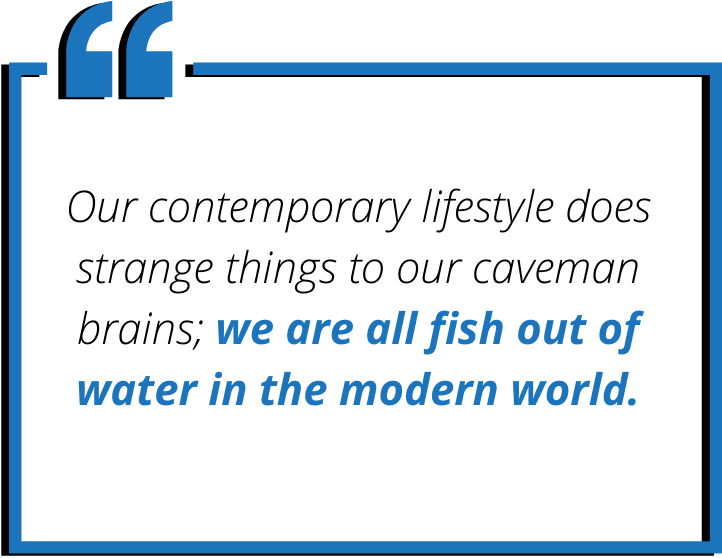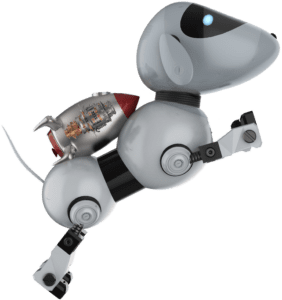Menu


You're saying I'm a robot?
What does that even mean?
For starters, it’s important to not take this too seriously. The human brain is the most complex thing in the known universe. To reduce it to our current concept of “robot” would be improper on multiple levels. With that said, it can be useful to think of yourself as a robot. To occasionally look at yourself in this way—what we will call, “taking on the robot mindset”—will help you better understand certain aspects of your experience. The essence of this robot metaphor is that you are greatly influenced by the robot-like processes of your unconscious mind. The development of this concept will provide you with great explanatory power and a deeper sense of why you feel, think, and act the way you do. It will assist you in identifying what is holding you back and untangling the tricky areas of your life. By helping you to see things more clearly, this mindset will allow you to make better sense of life and move through it more smoothly.

The Robot Mindset
The essence of taking on the robot mindset is to take a peek under the hood and look at the different systems within your brain that influence the course of your life. A foundational insight in developing this mindset is the idea that what we are conscious of is just the tip of the iceberg. As suggested above, your unconscious mind plays a much larger role in your day-to-day operations than most of us intuitively realize.
When talking about the unconscious brain, it is important to clarify from the outset that we are not talking about some deep force with a dark agenda that is continually trying to undermine your better judgment. This conception is a legacy of the Freudian era and is no longer commonplace amongst scientists. The modern view is that your conscious and unconscious brain systems complement one another. Each has its strengths and areas of expertise. There will be instances when the systems conflict, but for the vast majority of the time, it is best to think of the conscious and unconscious minds as partners working together to solve the problem at hand. Let’s get to know these parts of yourself a little better.
The Unconscious Mind
Your unconscious mind is extremely powerful and processes much more information than does your conscious brain. Though your conscious mind can do some very special things, it is not the true workhorse in the relationship. Your unconscious is always churning in the background. It is constantly performing calculations and outputting judgments. A common way these judgments are expressed is through your emotions. Though emotion is a major avenue by which the unconscious guides you, it is not the only way. The reach of your unconscious is far, and it directly influences your desires, guides your decisions, and even shapes your patterns of conscious thought.
Though your unconscious mind is extremely powerful, it is not as flexible as your conscious thinking. Much of your unconscious processing has a rigid, hardwired quality. These instinctual systems have been slowly molded through hundreds of thousands of years of evolution and often will not provide us with the best guidance in the quickly changing modern world. Here, evolutionary psychology plays a significant role in helping us to understand our robotic programming.

For those not familiar with evolutionary psychology, it is a discipline that looks at the human brain in terms of the environment in which it slowly evolved, that of our hunter-gatherer ancestors. In this view, our brains are not so much general-purpose problem-solving machines. Instead, they are comprised of many specific, instinctual systems designed to help us thrive within our ancestral environment. We run into many problems today because the modern world is vastly different from the one in which we were designed to operate.
A very basic example of an ancient reaction that is now often counterproductive is the fight or flight response that many of us experience during challenging situations. Most of the problems we currently face would instead benefit from a calm, rational approach. Another example would be the emotions that cause us to care too much about what others think of us, an instinct that has its origins in tribal life. This tendency causes us to even become anxious about the judgments of strangers, people whose opinions have no bearing on our lives.
Our contemporary lifestyle does strange things to our caveman brains; we are all fish out of water in the modern world. Evolutionary psychology complements the robot mindset by helping us understand why we are the way we are and why we experience many of the problems that we do. By understanding and appreciating the forces that guide you, you can learn to reduce internal conflict and move through life more effectively.
Know Thyself
It is likely strange for you to consider that unseen forces within you have such a large impact on the course of your life. This idea naturally raises questions about whether “you” are truly in charge. You are, without question. Nothing on this site is intended to make you feel as though there is an alien living inside you, controlling everything you do. There are no notions of fatalism here. You are still master of your destiny and have free will in the most important sense of the term. You needn’t relinquish your ideas of personal agency, though you might find yourself thinking a little differently about what “you” are. You are more than just your conscious thoughts. You are the sum of both your conscious and unconscious processes. This is not a bad thing.
Though it might initially feel unsettling to think about being driven from beneath, consider that we often prefer it. We like to be in a state of flow where we don’t have to think a lot about what we are doing, where we just know our next move and are fully engaged in the task at hand. Our conscious mind does not have near enough bandwidth to make all the judgments and decisions required to move us through the world successfully. Can you imagine what life would be like if you had to consciously consider and decide about twice as many things everyday? How about ten times as many?
Your unconscious is an amazing thing. It is huge. It is you. Embrace the notion that you are vast and contain much more than meets the eye. Take on the robot mindset and get to know these parts of yourself that you may find unfamiliar. And if, in the process, you find parts that you are not in love with, this is okay. Accepting your flaws is certainly important, but the other side of the coin acknowledges that just because something is hardwired does not mean it is unchangeable. Hardwired simply means that this aspect is not under direct conscious control; it is not to say these systems can’t be influenced and molded. Seeing them clearly and understanding what is at play is the first step towards change.
Though your unconscious is prone to certain errors, it is, on the whole, a beautiful thing. Everything that makes life worthwhile, from love to joy to beauty, is made possible by the expression of our emotions and the unconscious processes that generate them. The architecture of everything we value originates in this mysterious world beneath our consciousness. It is responsible for many of the things that you most cherish and hold essential to your identity. It truly is what makes you, you.



A Beautiful Thing
To conclude, you are not just the thinker of your thoughts. You are not just your consciousness. You are much, much more, and this is a beautiful thing. To take on the robot mindset is to embrace yourself as the integrated whole. To extend our metaphor, you are not some helpless creature along for the ride. You are not trapped inside and controlled by a robot. You are the robot.
Many of your greatest strengths and talents have their roots in your unconscious supercomputer. You have a wellspring of power, wisdom, and courage that lies beneath the surface. Confident Robot is about tapping into this amazing resource. So often in life, you know what to do deep down, but end up overthinking things and getting in your own way. The robot mindset is about learning to trust yourself and developing confidence. This approach will help you relax, let go, and move with yourself. You are more vast, amazing, and capable than you realize.
To see the robot mindset applied to a practical issue and to better understand how looking through this lens can be beneficial, I recommend visiting my series A Robot’s Guide To Worry.
